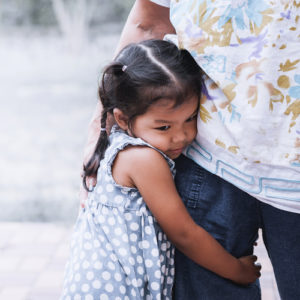Doctors’ Notes
BackAnxiety
We’ve all heard the term “anxiety,” but what’s the difference between normal worries and fears and a clinical anxiety disorder?
 Worries and fears are a natural part of development and childhood. But when these worries become excessive or bothersome to your child’s daily functioning, there may be something else going on.
Worries and fears are a natural part of development and childhood. But when these worries become excessive or bothersome to your child’s daily functioning, there may be something else going on.
Anxiety disorders are the most common psychiatric disorder for children and adolescents, with prevalence ranging from 10-30%. The cause of anxiety disorders is not fully known, but is thought to be a complex interaction of biological, psychological, social, and environmental factors.
What are Symptoms of Anxiety?
Anxiety can look different for everyone, but here are some general symptoms of anxiety:
• Restlessness
• Difficulty concentrating
• Trouble falling asleep or staying asleep at night
• Avoidance of school or fearful situations
• Fear of meeting new people, new places, or crowded places
• Excessive need for reassurance
• Over- or under-eating
• Preoccupation with performance
• Panic attacks (trouble catching breath, dizziness, trembling/shaking, sweating, hot flashes, chills, “sense of doom”)
• Other generalized symptoms (diarrhea, stomach aches, headaches, pain)
Is This Normal?
Experiencing worries and fears is a natural part of development for children. The problem is when these worries and fears become excessive, persistent, and start to affect daily life. If your child is having difficulty with school performance, peer relationships, or with home life due to anxiety, it may be more than “normal” anxiety. The line between normal and abnormal anxiety can be grey, so if you’re asking this question, a visit to the office may help clear the picture.
What Can You Do?
As a parent, it can be overwhelming if your child is experiencing anxiety. But challenges like this can be opportunities for us to teach our children how to handle those big feelings.
Role Modeling.
The first step in teaching as a parent is often role modeling. It may help to think about the following questions yourself:
1. What makes me anxious?
2. How do I cope with anxiety provoking situations?
3. How does my child see me respond to anxiety provoking situations?
Understanding your own answer to these questions can often help you to understand, and be a good role model for, your child.
Supportive Care
Supportive care for anxiety can include stress management, relaxation techniques, and exercise. You can teach your child healthy stress relieving techniques like the ones listed below. Many of these can be incorporated into your daily family routine.
Exercise: Believe it or not, physical and mental health go hand-in-hand. Encourage frequent outside play, dance, riding bikes, or any other physical activity your child enjoys.
Expression: Encourage your child to express their feeling as she feels best. Some examples include drawing, dancing, talking, art, or music.
Downtime: Do not overschedule or overwhelm your child. Provide time for him to relax.
Sleep Hygiene: Allow time before bed to be quiet. Avoid TV or screens 2 hours before bed. Also, a warm shower or bath, practicing deep breathing when lying in bed, and aromatherapy can assist with restful sleep.
Deep Breathing: This technique is very helpful in peak moments of anxiety. Demonstrate to your child how to slowly inhale deeply through the nose while counting to 5, then exhale through mouth counting to 5. Repeat until feeling less anxious.
Psychotherapy
Counseling is a mainstay of the management of anxiety disorders, when determined by your pediatrician. If the disorder is associated with other psychiatric disorders present, medication management is another option, along with coordination of care with a psychiatrist.
One Last Calming Thought
Anxiety is a very real and valid feeling, and it’s a big feeling that many children and adolescents do not know how to handle with when they do experience it. We can help you teach your child how to manage these big feelings in a healthy way from a young age. If you have concerns about your child’s anxiety or mental health, schedule an appointment with one of our providers. We can help you make a difference for your child’s life, now and for the future.
Rachel McCarrison, DNP, RN, CPNP-PC, has been a Kids Plus Provider since 2016.
Danielle Belfiore spent a rotation at Kids Plus as a PA Student from Slippery Rock University.